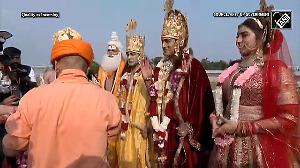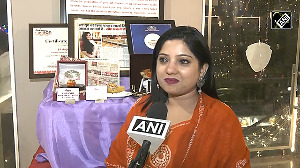"To be honest, the statement could have been better [if it mentioned the Kashmiris]. They have mentioned many things in the statement, including Jammu and Kashmir, but a mention of Kashmiris is nowhere to be found," the Mirwaiz told rediff.com in an interview from Texas where he was visiting relatives over the weekend.
"Both sides say the settlement has to be in accordance with their wish but it does not talk about the people of Kashmir. I did raise this with President Pervez Musharraf and he said, 'our position is very clear, we want a settlement after considering the wishes of the people of Jammu and Kashmir'," the Mirwaiz said, referring to the meeting between the APHC delegation, led by him, and President Musharraf on Friday, on the sidelines of the UN General Assembly.
He parried a reply when asked if he felt frustrated by the absence of a reference to Kashmiris; nor did he reveal what he was told by Musharraf at their meeting regarding the absence of reference to Kashmiris in the joint statement. "The Pakistan President has invited Prime Minister Singh to Pakistan and he said one can pick up the [thread of the] talks from there and already the back channels are active," the Hurriyat leader said.
Musharraf was asked the same question at a press conference on Thursday at the United Nations, and he had said while any resolution has to be accepted by all three sides -- India, Pakistan and the Kashmiris -- the inclusion of Kashmiris will take some time. 'There are certain sensitivities which need to be tackled first,' he had told journalists.
Even though he welcomed the dialogue process as well as the most recent summit between Singh and Musharraf, the Mirwaiz said he felt the process lacked seriousness in the sense New Delhi was not addressing the concerns of the people of Jammu and Kashmir. "We feel now that obviously the situation has changed and we have entered a very crucial phase in the dialogue, the talks should have a direct effect on the ground so people could feel the change," he said.
"But unfortunately it is not there. It is fine that India and Pakistan have started a dialogue and we support it and welcome the confidence building measures, but there has been no Kashmiri-specific CBM," the Mirwaiz said.
"There is a ceasefire across the Line of Control [dividing India and Pakistan in Kashmir] and Indian and Pakistani troops are not firing at each other, but the people in Kashmir are still getting killed, there are problems they are facing on the ground," he said.
Complete coverage: PM at the UN
"I think India has to take some measures so the common Kashmiri can say 'yes, this is something good, we can feel there is a change in the situation and in the mood and attitude of the Indian armed forces'," the Mirwaiz said. "That will send a positive message to the people of Kashmir. There is a need for a little more seriousness on the part of all the parties, especially the Government of India."
Asked what those measures could be, he said there were many things the Indian government can do. "We have said political prisoners could be released, and then there is the issue of human rights of civilians, the issue of the tremendous amount of power given to the armed forces by way of the Armed Forces (Jammu and Kashmir) Special Powers Act etc. If such laws could be repealed, it will send a positive message to Kashmiris," he said.
The Mirwaiz, who is slated to address the meeting of the Organization of Islamic Countries at the United Nations on Monday, said he did not agree that the summit between Singh and Musharraf did not achieve anything or that it was a failure. "Honestly, I do not agree with that view, I feel the talks are very much in motion," he said.
"There are always hiccups when you are dealing with a sensitive issue like Jammu and Kashmir, but I think when we had our deliberations with Prime Minister Singh in New Delhi last week, we sensed for the first time that there is a realization in the Indian government that you cannot have a solution for Kashmir through force or intimidation. The prime minister did refer to the fact that a political problem needs a political solution," he said.
'Hurriyat does not represent all of J&K'
"India is talking to Pakistan, India is talking to the Kashmiris. Let us move on. There are differences, there are issues that need to be resolved, there are small hiccups, but no hiccups could be as strong as to bring about death to the process," he said. "We have to overcome these small hiccups and, honestly, I do not think the meeting has not gone down well as some people are saying."
The Mirwaiz said there was a need to move forward, to build trust among all parties concerned, and everyone must recognize that the focus has to be on a political settlement through dialogue. "Force, whether by Kashmiris or Indians, is not going to work. Therefore, to resolve the problem, let us move on [with the dialogue]," he said.
Admitting there are people in Kashmir who do not support the dialogue process, the Mirwaiz said the APHC believes there is no other way to resolve the problem.
"We feel we have to have a solution and for that we need to move beyond the traditional position, all of us, India, Pakistan and the Kashmiris. I think it is important that the people of Kashmir realize that if we are looking at a solution, we are looking at a position of flexibility from all sides."
Describing himself as an optimist, the Mirwaiz said in order to have a solution all the parties need to have a vision and a sense of accommodation. "All must realize that more than politics, as far as Jammu and Kashmir is concerned, basically it is a human issue. There is suffering, there is pain, and there is agony. We need to understand that and try and address the needs of the people and, of course, have a solution when every party is in a position to tell the people that 'yes, for the greater cause of peace and stability, we have resolved the problem'."





